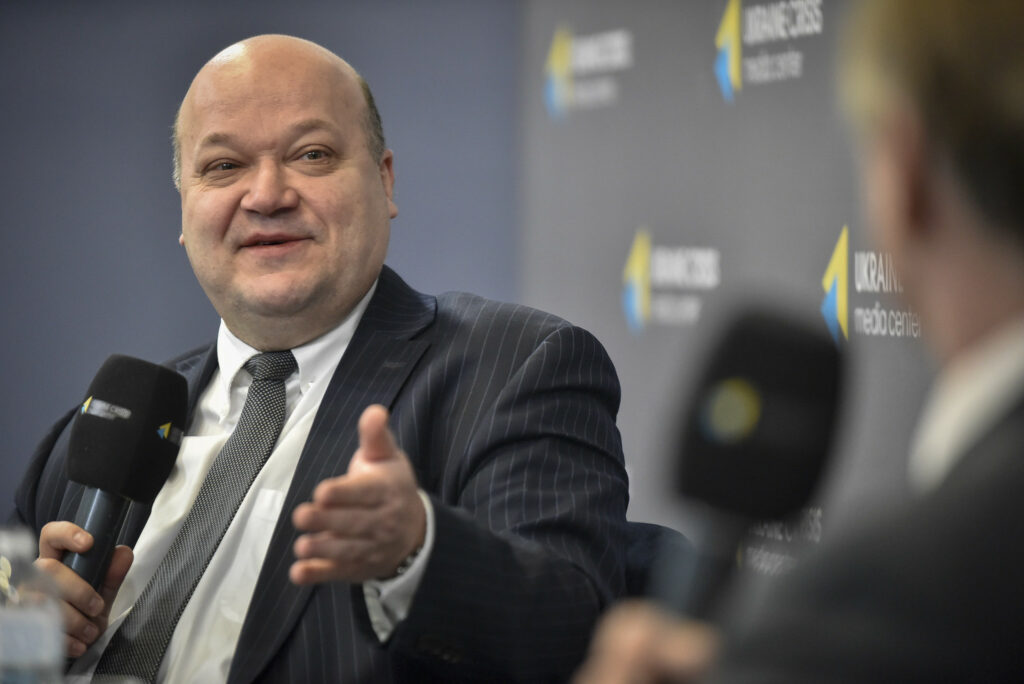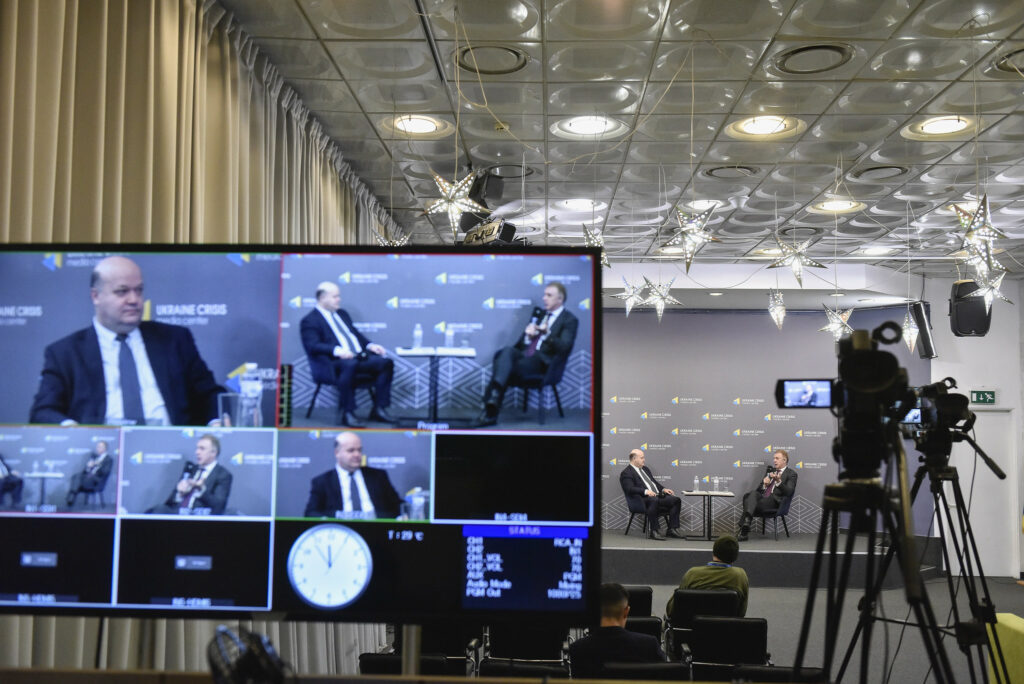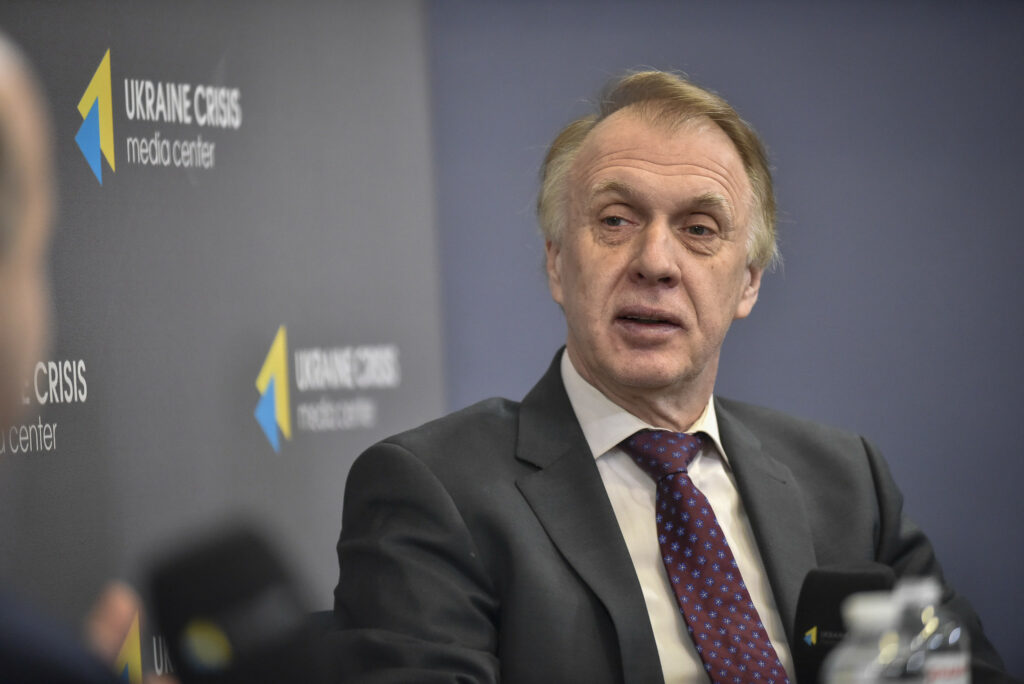In 2005, the Ukrainian state started a new professional holiday – Diplomatic Service Day, which has since been celebrated on December 22. Another regular meeting in the Geopolitical Dialogues format at Ukraine Crisis Media Center opened with this topic.
Valeriy Chaly, Chairman of the UCMC Board, Ambassador Extraordinary and Plenipotentiary of Ukraine, Ambassador of Ukraine to the USA (2015-2019) congratulated his renowned diplomat colleagues and personally addressed the guest – Volodymyr Ohryzko, Ambassador Extraordinary and Plenipotentiary of Ukraine, Minister of Foreign Affairs of Ukraine (2007-2009) and called him a consistent Euro-Atlanticist who has not changed his views on Russia for a long time and is one of the first diplomats who understood Moscow’s goals.
“I congratulate all our diplomats, those related to the diplomatic service, and you, Valeriy Oleksiyovych, for your personal contribution to the fact that today Ukrainian diplomacy is known and recognized worldwide. We have finally risen to the highest levels of international diplomacy. I think that today, thanks to its diplomacy, Ukraine is known across the globe,” Volodymyr Ohryzko noted.
The participants of the Geopolitical Dialogues emphasized that not only specialists in this field are engaged in diplomacy today. Volodymyr Ohryzko thanked public organizations for active protection of Ukraine’s national interests in the world, and Valeriy Chaly mentioned the strategy of public diplomacy.
“I mean both our diaspora abroad and our journalists,” he specified.
The next topic was an analysis of relations with the Russian Federation in the past, including a discussion of the location of the Black Sea Fleet in Crimea. The head of the UCMC Board asked whether we should use mirror techniques against the Russians now.
“If they consider Crimea to be theirs, we can consider that a big part of the territories along our borders with Russia was also part of Ukraine. We can also conduct defensive actions against them,” he explained.
According to Volodymyr Ohryzko, after our victory on the battlefield, which he is one hundred percent sure of, Russia will begin to fall apart. Then the question of the right to self-determination will arise, and not only of territories, but of national minorities, the peoples who live there.
“Why does the West believe that Russia is something single and indivisible? Don’t the Volga Tatars have the right to self-determination? Don’t the Adygeans or Chechens have the right to self-determination? And the Evenks? No? Why not?” he asked.
The diplomat is convinced: if it comes to that, parts of the territory of modern Russia that were once Ukrainian will also have the right to say that they belong either to new entities that will emerge on the territory of present-day Russia, or to return to the territories from which they were taken away.
Valeriy Chaly mentioned the collapse of the Soviet Union. At that time the Republic of Sakha (Yakutia) even had a draft document on independence. However, later they agreed to transfer the rights. Thus, there is a precedent when autonomies can emerge. There are several such documents.
“Yeltsin then appealed to the regions to take on as much sovereignty as they could swallow. And this slogan was heard. Tatarstan, Bashkortostan, and Sakha wrote in their constitutions that they are independent states within the framework of the future Russian Federation. Then Yeltsin’s advisers shook their heads and agreed that it was time to end all this, because Russia would collapse. And during the later years of Yeltsin regime, they began to take away powers from these republics. And Putin completed this processt,” Volodymyr Ohryzko continued the topic.
Valeriy Chaly, in his turn, spoke about how he had seen secret letters about Russia on the verge of collapse: “It was a long time ago. I was skeptical about it at the time, but now the war can trigger this process. It greatly changes the situation for Russia itself.”
Evaluating the processes taking place in the Russian Federation, Volodymyr Oрryzko suggested that it is not Putin who forms such a worldview of Russia. He expresses aspirations inherent in the Russian population.
“No one in the West wants to study Russian history,- he continued. – The most they read are headlines and half a centimeter below them about what happened yesterday and the day before yesterday. And they are not even interested in knowing what happened in the seventeenth century. And the answer is there. If you don’t know it, you can’t understand why this is happening today.”
In his opinion, Western partners have to completely rethink Russian history and mentality and stop talking about “great Russian culture”, because it is all fantasy.
“Great Russian culture” is Bucha, Mariupol, and the same Chechnya where 300,000 people were destroyed as a result of the war. I read the testimonies of eyewitnesses on this topic, and you know, I am horrified by the brutality committed by the Russian troops in Chechnya. And all this grows out of hatred for the world around us,” Volodymyr Ohryzko stressed.
Valeriy Chaly thanked his colleague for researching Russia, as well as forming a group of people around him who are learning more and more about how to transform it.
“I wish all Ukrainians better mood and technological weapons to reduce the losses of our soldiers. Thanks to those who are now on the front line for the opportunity to discuss this topic and think about the future. Two years ago, we were thinking about how to survive, and today we are thinking about how to transform Russia,” the Chairman of the UCMC Board said at the end of the meeting.





